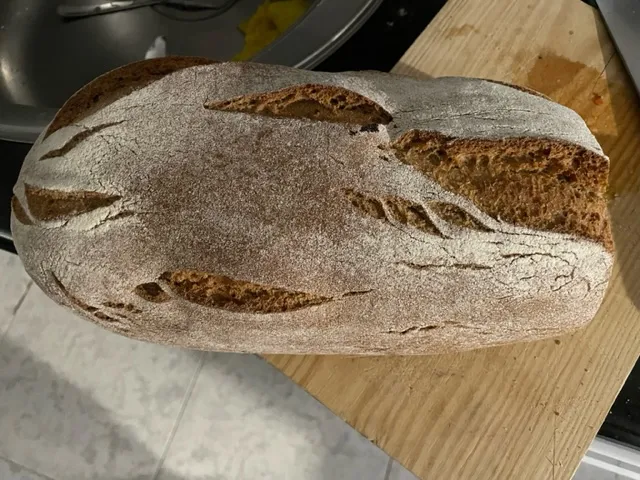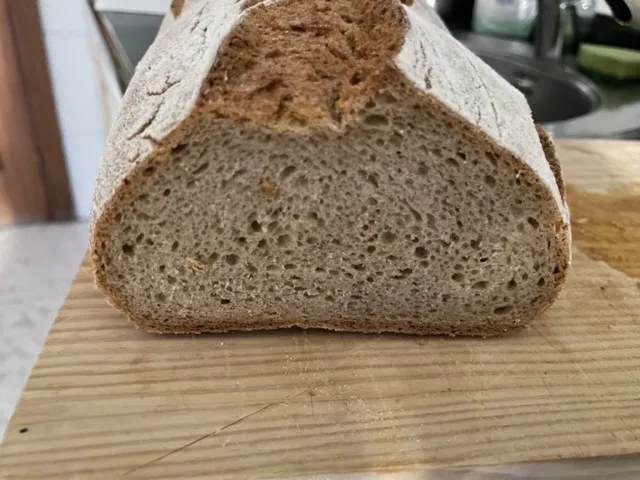I'm planning a four or five hour hike tomorrow morning and this evening, not finding a bakery open, I went into the LIDL supermarket in Arrasate and bought the only bread (they bake them there) still on the shelves at 9:30 pm. It's billed as pan de centeno (no Basque name given, though google translate suggests zekale-ogia) -- 67% rye, according to the store's description (though it didn't say whether whole or medium or light).


The crust looks prime but unf, there's little structure & no crunch. The crumb is a bit moist -- but it's a high rye, so it can be forgiven. The flavor leans graham cracker: a little sweet and no tang at all, so definitely not a sourdough. But it's growing on me. I mean, hey, it's a rye, and I haven't had my fix in several weeks.
Rob
Looks good! Enjoy the hike.
In Donostia/San Sebastian, I found Galparsoro Okindegia and bought their 100% rye, which their website specifies, somewhat oddly, is made with a wheat levain. Tons more flavor, with a lovely caramelized crust. Like most high ryes, it's getting better and more balanced as the hours pass.
Rob
Good looking bread. What aspects of the hike are most noteworthy?
It's an amazingly beautiful place -- and, at least in the region where I've been staying, you can find well-marked trails through the mountains quite easily. In fact, google maps worked rather well, mostly featuring off-road paths. Many of the trails are also good for mountain biking, which is popular here. Be prepared for a serious work-out. By the time I finished, I had gone up 700 meters and come back down and walked 25 kilometers. My phone's health page told me I had climbed 150 flights of stairs.
The area I walked through included private farms, nature preserve, and a local reservoir, though there was one hilltop where hunting was allowed and I saw a number of blinds, which were thankfully empty.
Still, the best for me was the week before, when I was hanging out with a shepherd/artisanal cheesemaker in the somewhat higher mountains of Enirio-Aralar.
And, since this is a bread site, I cooled off from my 25 k walk with a caña, which is, of course, liquid bread.
Rob
You're making me feel thirsty, Rob!
Lance
Cheers, Lance.
I'm on my way to Switzerland today by train. I bought a different artisan Basque rye -- this one by a bakery called The Loaf -- https://theloaf.eus/producto/centeno-100/ -- which advertises it as made with a 24-hour rye biga plus a 24 hour bulk ferment.
Can we believe this? In my experience, ryes often move super-fast after a 24-hour preferment, even if the hydration is limited.
This bread has a solid sour flavor--though the tang is oddly different than the German and E. Euro ryes I tend to make. The word I would use to describe it is 'thin.'
Rob
Let me know if/when you'd like to meet up!
And super beautiful and interesting about Basque country! Would love to visit. I was surprised during our visit to Porto last week, that in a fish tavern by the ocean they served some rye bread! It was a simple good rye bread, nothing unusual, but for a southern country it was unexpected - usually rye is popular in places where it's too cold for wheat.
I'll know more after I arrive tonight.
That's super-amazing that you got rye in Porto! I was never served rye in the Basque Country. All pintxos come with white baguette-style bread. Hotels sometimes offered some brownish slices that might as well have been white.
I think Donostia/San Sebastian has artisan bakeries because it's an expensive beach and vacation town and is plugged into global trends like the concern for health (sourdough) and interest in other, supposedly more digestible, grains (they offered spelt as well.) The supermarket was probably following that trend as well.
They served a few slices of rye bread, and a few slices of bread with chunks of sausage (chourico) baked in it :) That seems to be a very typical type of bread there, we saw it in many bakeries. Tasty, but a little strange.
The biga seems to be fermented with a sourdough starter, rather than yeast. Perhaps what we would term a "low inoculation stiff levain"?
Lance
Wow what a great trip you’re doing Rob. Thanks for sharing some of the local breads and scenery. Enjoy the rest of your trip.
Benny
Thanks, Benny. I can't complain about my work, that's for sure.
Rob